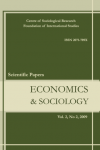INVESTIGATION OF ACCOUNTING
MANIPULATION USING THE
BENEISH MODEL: HUNGARIAN
CASE
INVESTIGATION OF ACCOUNTING
MANIPULATION USING THE
BENEISH MODEL: HUNGARIAN
CASE
Author(s): Veronika Fenyves, Tomasz Pisula, Tibor TarnócziSubject(s): National Economy, Business Economy / Management, Accounting - Business Administration
Published by: Fundacja Centrum Badań Socjologicznych
Keywords: Beneish model; accounting manipulation; financial statements; Hungarian companies;
Summary/Abstract: The study examined the manipulation level ofHungarian corporate financial statements using Beneish’sM-score model with eight variables between 2017 and2021. The research also investigated whether the financialstatement manipulations depend on the type of sector,company size and age, and region. The research samplewas comprised of 32,024 financial statements each year.Statistical tests were used to compare the M-score valuesof several groups. The proportion of companies withpossibly manipulated financial statements varied between46.43% and 51.67% in the five years. It can be concludedthat the manipulation of Hungarian companies’ reports isvery high. The analysis showed that the ratios of unlikelymanipulated (UM) and likely manipulated (LM) reportswere improved at size category 1-4, and size category fivesignificantly improved. The comparison by regionsrevealed that the UM/LM indicator is lower in moredeveloped regions than in less developed ones. Theresults draw the attention of government decision-makersto pay more attention to checking financial statements. Inaddition, it shows to the companies’ stakeholders that thereliability of the financial statements must also beconsidered during their decision preparations and riskassessment.
Journal: Economics and Sociology
- Issue Year: 16/2023
- Issue No: 4
- Page Range: 347-363
- Page Count: 17
- Language: English

